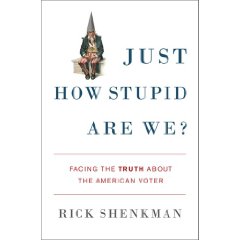Rick Shenkman, is the author of the just-published Just How Stupid Are We? Facing the Truth About the American Voter (Basic Books, 2008). He blogs at Howstupidblog and is editor of George Mason University’s History News Network
Shenkman writes:
I do not wish to engage in a debate about the Iraq War. But the thought of planting a largely Christian army in the middle of the Muslim Middle East over the opposition of most countries in the region, when put as I have just put it, sounds daft. Why did it not ring bells of alarm to Americans in 2003 and after, especially as it became clear that our troops would be staying a long time and that no quick victory was possible? It did not because the administration saw to it that the issue was framed differently. We weren’t planting an army. We were spreading God’s miraculous gift of freedom to a benighted people very much in need of America’s missionary help. It was the triumph of myth over logic.
Why were Americans so susceptible to myth? Foreign policy specialists don’t usually spend a lot of time reflecting on this question. They should. It’s the key to what often goes wrong when foreign policy issues become the subject of public debate.
The answer is, I’m afraid, simple. Myths count more than facts in these debates because Americans don’t know many facts and don’t care to take the time to learn them. Unlike subjects with which they have first-hand experience–think gas prices–matters related to foreign countries are both exotic and incomprehensible to most Americans. This leaves them sitting ducks for wily pols who want to take advantage of their ignorance by playing on fear and patriotism.
The extent of Americans’ ignorance is underestimated. Only two in five know we have three branches of government and can name them. Only one in five know there are 100 US senators. And five years into the war in Iraq only one in seven can find Iraq on a map. Someone once said–the author is in dispute–that war is God’s way of teaching Americans geography. It’s a great line, but rather optimistic. A majority of Americans still haven’t bothered to take a look at the map of the country where we have been bombing and killing people since 1991.
Not all is grim. On the positive side, Americans did not make wholly irrational demands of their leaders after 9/11. American Muslims were not rounded up and sent to concentration camps after 9/11 (as Japanese-Americans were after Pearl Harbor). Mosques were not closed down. Nuclear weapons were not employed against our perceived enemies. And nobody was lynched. Given what has happened in American history any one of these responses or all of them might have been anticipated. That none occurred and that nothing like them occurred is worth noting.
But polls indicate that a significant segment of the American public was susceptible to wild conspiracy theories. A Scripps-Howard poll in 2006 found that 36 percent believe that it is “very likely” or “somewhat likely” that U.S. officials either allowed the attack to take place or were involved it.
Americans do not have a monopoly on conspiracy thinking. Nineteen percent of Germans said in a 2004 poll that 9/11 was the work of the CIA and Israel’s Mossad. The French turned Thierry Meyssan’s book The Appalling Fraud into a best-seller, despite the absence of evidence for its chief and crazy claim: that the Pentagon attacked itself on 9/11 with a cruise missile. Millions of Muslims around the world persist in believing that Jews were given advance warning of the attack on the World Trade Center.
But instead of the thoughtful debate we should by rights have had in this country, we settled for slogans:
We must fight them over there so we don’t have to fight them over here
The Global War on Terror (GWOT)
Mission Accomplished
You are either with us or with the terrorists
The axis of evil
To be sure the public eventually turned against Mr. Bush’s war in Iraq. The one thing the public usually gets is success and failure. And Mr. Bush’s war has been a spectacular failure when judged against all of the many measures by which he has asked us to judge it.
As we head into the Fall campaign and listen to the debates about the war we should keep in mind the limits of public opinion. If we don’t begin to address the problem of gross public ignorance there will be more Iraqs.
One poll finding we should all keep in mind is this. Even after the 9/11 Commission reported that there was no connection between Saddam Hussein and the Sept. 11 attack 50 percent of the country persisted in believing there was. The implications of this are mind boggling.
Rick Shenkman
George Mason University




 © 2025 All Rights Reserved
© 2025 All Rights Reserved